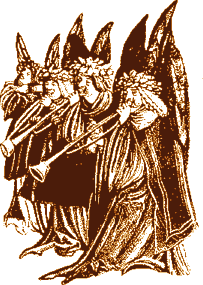The music of the spheres?
The bitter-sweet dialogue between the married couple, Jessica and Lorenzo, at the beginning of the final act of The Merchant of Venice, is one of Shakespeare's most direct passages on the nature of music. Lorenzo describes the "moonlight" on the stage (remember that the Globe had no lighting effects!):
How sweet the moonlight sleeps upon this bank!
Here will we sit and let the sounds of music
Creep in our ears: soft stillness and the night
Become [are appropriate to] the touches of sweet harmony.
(5.1.60-64)
Lorenzo then discusses the stars, each in its separate "orb," or sphere, each sphere contributing to the heavenly music that only the angels (cherubins) can here. Ordinary humans, clothed in their earthly, decaying bodies, cannot hear the music of the spheres:
Sit, Jessica. Look how the floor of heaven
Is thick inlaid with patines of bright gold:
There's not the smallest orb which thou behold'st
But in his motion like an angel sings,
Still quiring to the young-eyed cherubins;
Such harmony is in immortal souls;
But whilst this muddy vesture of decay
Doth grossly close it in, we cannot hear it.
(5.1.65-71)
Finally, Lorenzo comments on the kind of person who is not moved by music.
The man that hath no music in himself,
Nor is not moved with concord of sweet sounds,
Is fit for treasons, stratagems and spoils;
The motions of his spirit are dull as night
And his affections dark as Erebus:
Let no such man be trusted.
(5.1.89-94)
You may remember that Shylock is disturbed when he hears that there will be musical masques in the street on the night he is invited out, and asks Jessica to lock up the house (2.5.29-37).
